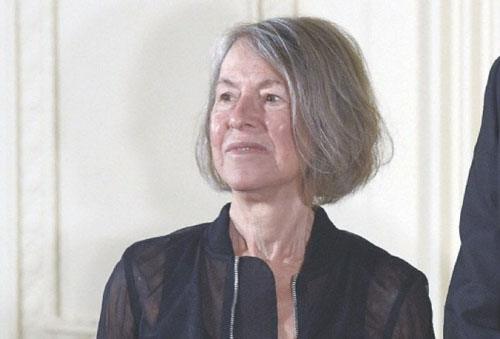Stockholm
American poet Louise Gluck won the 2020 Nobel Literature Prize on Thursday, an unexpected choice known for themes of childhood and family life that draw inspiration from myths and classical motifs.
Gluck, 77, was honoured “for her unmistakable poetic voice that with austere beauty makes individual existence universal”, the Academy said.
Gluck won the Pulitzer Prize in 1993 for her collection The Wild Iris and the National Book Award for her latest collection, Faithful and Virtuous Night, in 2014.
The Academy’s permanent secretary Mats Malm said he had spoken to Gluck just before making the public announcement.
“The message came as a surprise, but a welcome one as far as I could tell,” Malm told reporters.
Gluck was not seen as a favourite for the Nobel in the run-up to Thursday’s announcement — though betting sites’ odds on her reportedly plunged just before Thursday’s announcement.
The chair of the Academy’s Nobel committee, Anders Olsson, lamented that she was not more well-known, “at least outside the US’ borders”, and had not been translated into many other languages.
She is the fourth woman to win the Nobel Literature Prize in the past decade — after Olga Tokarczuk, Svetlana Alexievich and Alice Munro — and only the 16th since the Nobel prizes were first awarded in 1901.
A professor of English at Yale University, Gluck “seeks the universal, and in this she takes inspiration from myths and classical motifs, present in most of her works”, the Academy said in its prize citation.
“The voices of Dido, Persephone, and Eurydice — the abandoned, the punished, the betrayed — are masks for a self in transformation, as personal as it is universally valid.”
Her collections The Triumph of Achilles (1985) and Ararat (1990) address “almost brutally straightforward images of painful family relations”, the jury said, noting that her use of a “deceptively natural tone is striking”, with “no trace of poetic ornament”.
Gluck is also a poet of radical change and rebirth, describing in her poem “Snowdrops” the miraculous return of life after winter, her work often marked by “humour and biting wit”.
The jury said her 2006 collection Averno was a “masterly collection, a visionary interpretation of the myth of Persephone’s descent into Hell in the captivity of Hades, the god of death”.—AFP










